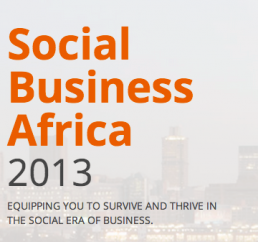What does ‘social business’ mean for an organisation?
Submitted by Melissa Attree on Wed, 2013-08-07 08:37

This is a popular question and in order to give a meaningful answer, it's best to revisit what 'social business' means and then unpack how this impacts on business decisions.
At its core, a social business understands that people do business with people. A social business focuses on leveraging conversations and collaboration in order to more effectively achieve overarching marketing, sales, communication and business objectives.
The concept of social business is forcing businesses to consider how they communicate effectively (internally and externally) and facilitating this communication using intelligent software and collaboration tools. It requires the adoption of a social ethos – this could mean challenging traditional hierarchies by acknowledging that business can, and should, be driven by all levels of the organogram.
In order to facilitate social business thinking, companies should be assessing how better to connect people (internally and externally) by providing the tech tools and platforms to enable better connections. Take into consideration the importance of offering tools that people are the most comfortable with, this will foster more organic collaboration.
The more we unpack the concept of social business the more evident it becomes that the move towards social business is a way of thinking rather than a specific division. It's a method of collaborating and solving business problems for the benefit of employees, the bigger business, and more importantly, the customers.
In the age of the social customer, customers are expecting businesses to better integrate social thinking into their systems and processes.
Keep these tips in mind when exploring a move towards social business thinking:
1. Acknowledge that becoming a social business is a long-term approach that involves a shift in culture, strategy and organization.
2. Invest in technology solutions that serve broad business needs. Don't let industrial age siloed IT decisions cramp your ability to effect change and promote collaboration. Smart IT systems should enable better human decision-making.
3. Begin by using your people and processes behind the firewall as a testing lab for social thinking and innovation – charity starts at home.
4. The best ideas often come from the most unexpected places – adopt a crowdsourcing approach and involve as many people as possible.
5. Be agile. Social business thinking means anticipating and challenging opportunities. Traditional business siloes hamper agility, move towards a truly integrated approach; don’t allow communication breakdowns between marketing, sales and customer service to erode your ability to be agile.
6. Make sure you have executive buy-in, understanding and support.
7. Ask your customers what they need and want, and build internal processes that channel this feedback into producing better products and services.
Want to know more about Social Business? Book your seat for this year’s Social Business Africa event. The full day conference is scheduled to take place on 20 August in The Forum at The Campus in Bryanston, Johannesburg. Tickets are R1 500 (excl. VAT) and are available from www.socialbusinessafrica.com. Follow sponsors and or the hashtag #SocBizAfrica on Twitter for further updates.


















